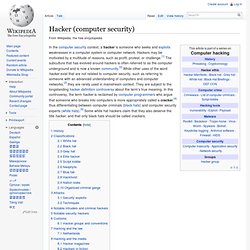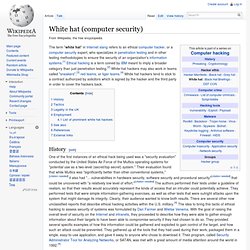

Australian spies buying computer bugs. David Sancho, from Trend Micro, says buying bugs from reseachers encourages them to find more.

Photo: Alex Schelbert The Australian government is buying computer security weaknesses found by hackers before they are sold on the black market, as part of its defence strategy, claim those at the coal face of cyber security. "The Australian government has developed these capabilities as part of ASIO, DSD [Defence Signals Directorate], CSOC [Cyber Security Operations Centre] and possibly others. But they are purely for research and defence," says an Australian security consultant who wishes to remain anonymous. Hacker. Bruce Sterling traces part of the roots of the computer underground to the Yippies, a 1960s counterculture movement which published the Technological Assistance Program (TAP) newsletter.

[citation needed] TAP was a phone phreaking newsletter that taught techniques for unauthorized exploration of the phone network. Many people from the phreaking community are also active in the hacking community even today, and vice versa. [citation needed] Several subgroups of the computer underground with different attitudes use different terms to demarcate themselves from each other, or try to exclude some specific group with which they do not agree. White hat. One of the first instances of an ethical hack being used was a "security evaluation" conducted by the United States Air Force of the Multics operating systems for "potential use as a two-level (secret/top secret) system.

" Their evaluation found that while Multics was "significantly better than other conventional systems,"[citation needed] it also had "... vulnerabilities in hardware security, software security and procedural security"[citation needed] that could be uncovered with "a relatively low level of effort.
"[citation needed] The authors performed their tests under a guideline of realism, so that their results would accurately represent the kinds of access that an intruder could potentially achieve. They performed tests that were simple information-gathering exercises, as well as other tests that were outright attacks upon the system that might damage its integrity. Clearly, their audience wanted to know both results. 7 Types of Hacker Motivations. Ethical Hacker. Ethics in Computing.